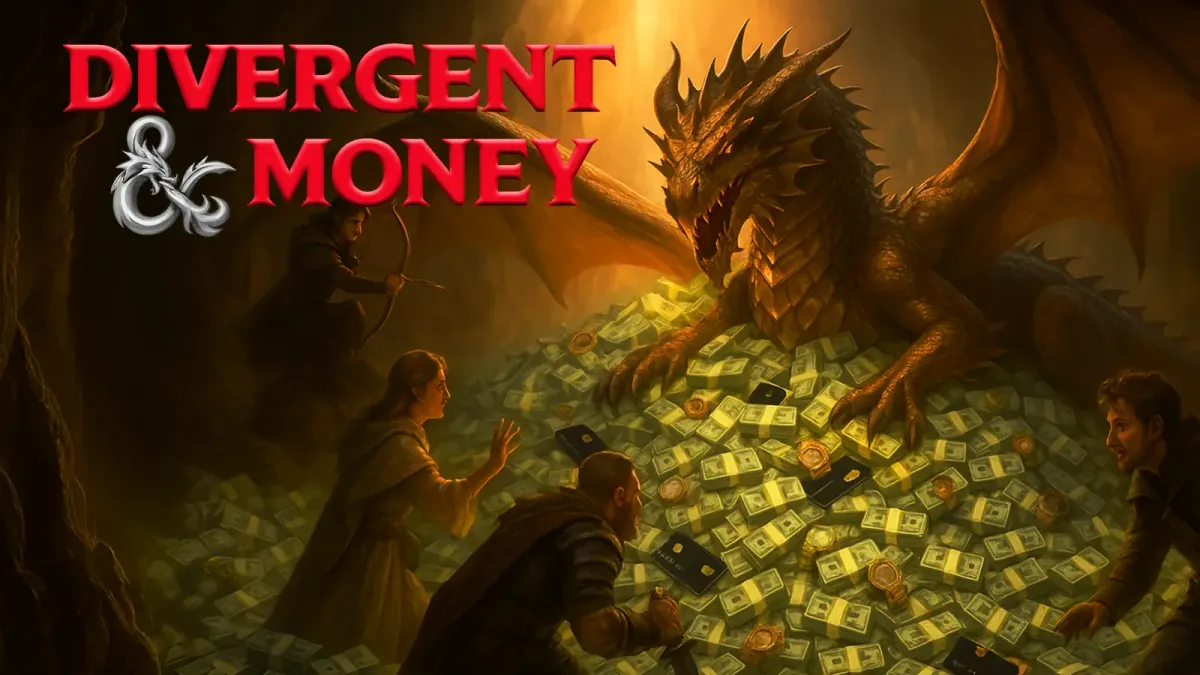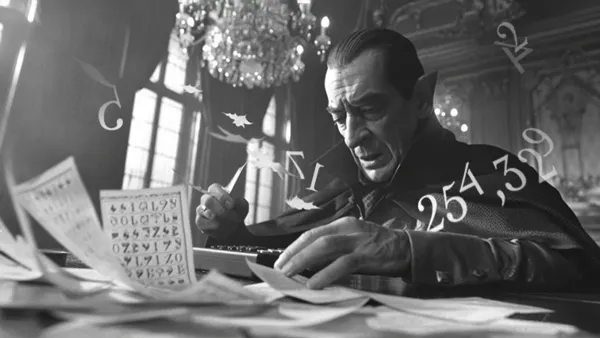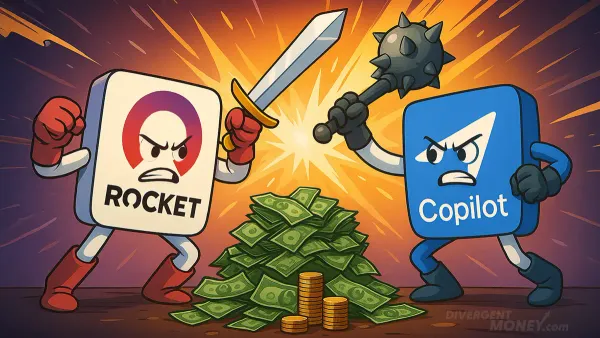Budget Like a Dungeon Master
What If You Built Your Budget Like a D&D Character Sheet? When traditional budgeting feels like trying to cast spells in a language you don’t speak, with zero spell slots and a DM who’s out to get you.

Because budgeting isn’t boring when dragons are involved!
Why This Makes Sense (Even If You’ve Never Held a D20) 🧠
For a lot of folks, traditional budgeting feels like trying to cast spells in an ancient, mystic language, with 'zero spell slots' and a Dungeon Master who’s out to get you!
So why not lean into the language of the druids? Have some fun with bugeting. Dungeons & Dragons, like your brain, is systemic, visual, and choice-driven. Kinda perfect.
It thrives on structure, stories, and stats.
What if we turned your budget into a living character sheet— a fantasy framework where different ways of thinking isn’t a liability, it’s a superpower?
Let’s dive in and design a campaign!

1. Choose Your Financial Class 🎭
Every party needs a mix of roles. So does your budget.
Here’s your starting lineup:
- The Paladin – Champion of the Emergency Fund. Budgeting with holy discipline.
- The Rogue – Side hustles, secret stashes, stealth savings. Will probably not tell the IRS everything.
- The Sorcerer – Chaotic spender. Magic = dopamine. Needs structure to survive.
- The Monk – Minimalist living, one subscription, zero drama.
- The Bard – Social spender, emotional Venmo-er. Thrives on vibes.
- The Warlock – Debt pact. Living large… but at what cost?
- The Cleric – Caregiver role. Always covering others’ costs first.
- The Ranger – Geoarbitrage master. Life is travel and spreadsheets.
👉 DM tip: Build your budget like you’re choosing a class. Strengths, weaknesses, and modifiers included.Your budget starts with your role in the party. Each class has strengths, blind spots, and unique financial traits.
Which are you? Mix and match. Drop your alignment and class in the comments.
2: Your Gold = Cash Flow 💰
In fantasy, gold buys spellbooks and horses.
In life, it’s rent, meds, therapy, and frozen Trader Joe’s dumplings.
Track your income like loot:
| Type of Gold | Real-Life Version |
|---|---|
| Base Gold | Paychecks, regular income |
| Passive Gold | Dividend income, rent from familiars (aka roommates), cash-back rewards |
| Loot Drops | Refunds, gifts, overpayments, side gigs |
| Magic Items | Passive income, investment returns |
| Cursed Coins | Subscriptions you forgot about, "Buy Now, Pay Later" |
Gold isn’t just numbers, it’s energy. Spell slots. Capacity. And let’s be real: some months, you’re casting cantrips to survive.
Set up income like loot drops. Make it visual. Neurodivergent brains thrive on patterns, color, and progress. 💡
3: Assign Your Budget Stats 📊
Turn Your Budget Into an RPG Stat Sheet
A D&D character sheet has six core stats. So does your money.
Recast your spending categories as RPG stats.
Here’s how they map:
| D&D Stat | Financial Equivalent |
|---|---|
| Strength | Debt crushing ability 💪 |
| Dexterity | Flex fund maneuverability (groceries, gas) |
| Constitution | Emergency savings resilience |
| Intelligence | Financial knowledge + research power |
| Wisdom | Long-term strategy + boundaries |
| Charisma | Negotiation + social spending charisma |
4: Inventory (aka Expense Management) 🧳
Your budget’s like a backpack. There’s only so much you can carry before you’re encumbered.
In-game, too much gear = slowed movement.
In real life, too many expenses = burnout and overdrafts.
Inventory Items:
- Essential Gear: Rent, food, meds, utilities
- Magic Items: ADHD planners, apps, automation tools, meal kits, noise cancelling headphones
- Cursed Items: Auto-renewed subscriptions, debt interest, “Oops” Amazon buys at 2AM, overdraft fees
Use color-coding like rare-item tags:
🟩 = essentials
🟦 = helpful but optional
🟥 = actively hurting your stats
In-game, too much gear = slowed movement.
In real life, too many expenses = burnout.
Try setting “carry limits” per category. Stay light, move fast.
5: Side Quests & Boss Battles 🗺️
Give your financial goals narrative weight.
Don’t “budget.” Quest.
If you have ADHD or need motivation quests can drive you forward to a conclusion.
Don’t “track expenses." That’s boring.
Slay the evil lord.
Escape the rent dungeon.
Win the +5 Budgeting Sword. 🗡️
- 🐉 Defeat the Credit Dragon = pay down $500 of debt
- 💎 Recover the Amulet of Stability = build a $1,000 emergency fund
- 🚪 Escape the Rent Trap Dungeon = housing plan or move prep
- 🛡️ Unlock the Shield of Boundaries = say no to one major impulse buy
Reward yourself like a DM: dopamine, stickers, D20s, chocolate. You pick.
6: Feats, Traits, and Divergent Boosts 🧠
No two minds are the same, so budget like a spellcaster who knows their school.
Strategies for ADHD, Autism, and other divergent brains:
- Use XP-based systems to reward progress
- Stack financial tasks into ritual routines (pay bills with a soundtrack, always same day)
- Stack habits like spell combos (e.g. log spending after meals)
- Build in decision delay spells: force a 24-hour cool-off before big purchases
- Track money with visual dashboards not spreadsheets (bonus if you design your own character sheet!) Use color-coded visual trackers.
- Automate like a tech wizard (round-up savings, bill alerts)
Embrace the fact that you’re just a different class in the personal finance game. And you’ve been fighting with zero loot and a broken UI. This framework could be just the map you've been looking for. Now where did I leave my torch?
Your Budget Is a Character Sheet 🔮
Let's get to work, it's time to pick your class, assigned your stats, and track your gear. Design a budget that feels like a game, one you actually want to play.
🎲 The question isn’t “Can I budget?” It’s “What kind of character do I want to be?”
Meet the Divergent Party! 📝
At the Divergent Money meetup this month, the staff set about designing our own characters. Because if you're going to write an article like this, it's kind of a requirement, right?

El (Rogue/Warlock multiclass):
My character is Debtrix Hexblade, a rogue with six side hustles, three burner cards, and a credit score pact forged in the fires of retail therapy. She wears noise-canceling headphones like armor and swipes with precision, not permission. Her patron? The Goddess of Instant Gratification. Her familiar? A receipt-stuffed tote bag. Budget? Chaotic neutral. She’s clawing her way toward fiscal redemption, one auto-payment at a time. She might forget to log her expenses, but she never misses a vibe.
Kris (The Cleric of Cashflow):
I built Seren the Steward, Cleric of Cashflow and Guardian of Stability. Seren tithes 10% to her future self, keeps budgets with envelopes and Google Sheets, and lights candles during her Sunday finance rituals. She holds space for both compassion and compound interest. Her motto: “Every dollar has a job. Every soul deserves rest.” When loved ones falter, she’s the one quietly covering rent, dropping off groceries, and whispering, “We’ll figure it out.” Her savings account is modest—but her generosity is legendary.
Gideon (Wizard/Monk):
I created “Ekon the Ascetic,” who lives within a minimalist budget so lean it could bench press a Roth IRA. He maxes his HSA, labels envelopes, and believes in index funds and inner peace. Alignment: lawful efficient. "Has six categories for groceries alone. Master of sub-budgets. Believes ‘fun’ is just ‘discretionary spending’ by another name. Trusts compound interest more than people."
Will (Lore Bard/Artificer):
My budget character is Quorlan the Archivist, a deep-shelved Lore Bard with a knack for turning data into tools. He doesn't just track spending—he records financial history in ink and memory, optimizing for long-term advantage. His magical item is the Scroll of Pattern Recognition: once per week, it reveals an unseen trend in his behavior (usually Amazon-related). He’s careful, kind, over-prepared, and quietly building a fortress of future freedom—one annotated transaction at a time.
Build your Budget Character 🏗️
Now it’s your turn!
Pick a class. Assign your stats. Invent your cursed items- overdraft fees top my list.
Drop your character in the comments 💬 (you need to be a member), tag us in your post, or share using the hashtag #DivergentBudgetSheet
Let’s build a party where everyone plays their strengths.
Printable Bonus Character Sheet PDF 📥
This is a fantasy-styled tracker with coin icons, stat slots, inventory grid, and quest tracker, designed for dopamine-sensitive minds and ones that love adventure!
Subscribe to our weekly Substack newsletter to download. It'll be in this week's issue 📰 ⬇ 🤩
Your Turn ✨
What’s your class? Your financial alignment? What would your budgeting superpower be?
🧙 Tag a friend to join your adventuring party
📜 Share this post to your timeline or story
🎨 Create your own Budget Character Sheet and tag @DivergentMoney
Budgeting doesn’t have to feel like punishment.
It can be a campaign. A quest. A character arc.
Roll initiative.
Disclaimer: As ALWAYS, this article is for educational and motivational purposes and is not financial advice. Always consider consulting with a financial professional for guidance tailored to your unique situation.




